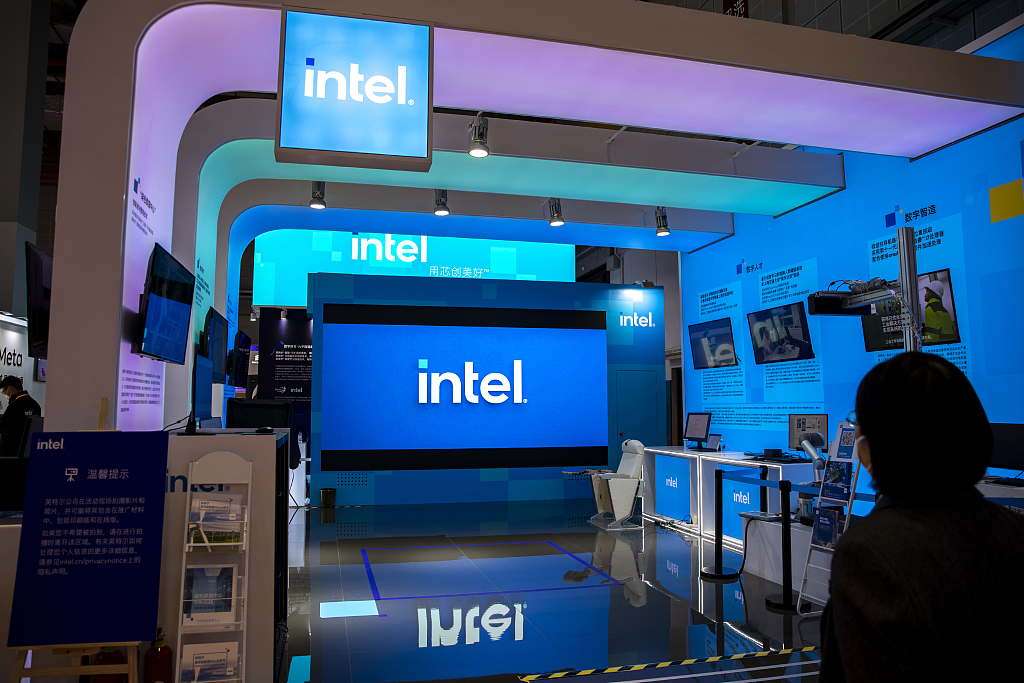
Customers line up at the entrance of an Apple Store, waiting to shop on the first day of sale for the iPhone 14 in Shanghai, China, September 16, 2022. /CFP
Customers line up at the entrance of an Apple Store, waiting to shop on the first day of sale for the iPhone 14 in Shanghai, China, September 16, 2022. /CFP
Editor's note: He Weiwen is a senior fellow at the Center for China and Globalization. The article reflects the author's opinions and not necessarily the views of CGTN.
On March 1, the American Chamber of Commerce in the People's Republic of China (AmCham China) issued the 2023 China Business Climate Survey Report, offering a less optimistic picture of business performance and confidence in the country.
The survey disclosed that 32 percent of its members surveyed had reported their China operations revenue rose in 2022, compared to 58 percent in 2021, 35 percent in 2020, and 45 percent in 2019, the pre-pandemic year. Thirty-four percent of them reported virtually unchanged, and another 34 percent reported a fall, much higher than that in 2021 at 14 percent, only equal to 2020 when the COVID-19 pandemic broke out in the country.
Nevertheless, the overwhelming majority of them still want to stay in China. Seventy-four percent of the members surveyed had no plans to leave the country, although a phenomenal drop from 83 percent in both 2021 and 2020. Twelve percent of them are considering to relocate away from China, up from 7 percent in 2021 and 8 percent in 2020. Those who have already started relocation had accounted for 12 percent in 2022 as well, a similar rise on 2021 and 2020 at 7 percent each.
China-U.S. tension by far the largest risk
The survey found that 66 percent of them listed "rising tensions" in China-U.S. relations as the number one risk in their Chinese business environment survey in 2023, up 10 percent from 2022, but lower than 2021, which registered 78 percent. The survey found that tense bilateral ties continue to stoke uncertainty in business decision making: Half of AmCham member companies are pessimistic about the future of U.S.-China relations in the coming year with three quarters of members reporting that their companies have been impacted by trade tensions.
The second largest risk is COVID-19 prevention measures, which accounted for 55 percent. Inconsistent regulatory interpretation and unclear laws and enforcement ranked third with 32 percent. Labor costs rising and regulatory compliance risks each accounted for 25 percent.
U.S. de-coupling doesn't move majority of U.S. firms out of China
Wang Rui, Senior Vice President and Chairman of Intel China, said a few days ago that Intel is not cutting its investment in the country. Last year, the company generated $17.13 billion of its revenue in the country, which has become its second largest market only after the U.S. Intel Chengdu plant's expansion has been completed, which provides 70 percent of Intel's global chip output.
Hence, neither the U.S. Chip and Science Act or Chip 4 Alliance, both of which target China for de-coupling purposes, nor the sweeping chips ban on China have made significant changes to Intel China's business.

The booth of Intel at the fifth China International Import Expo in Shanghai, China, November 9, 2022. /CFP
The booth of Intel at the fifth China International Import Expo in Shanghai, China, November 9, 2022. /CFP
With part of its assembly activities moving to India and Vietnam, Apple still keeps an extensive manufacturing network in China. It has been under heavy pressure from the U.S. Congress to leave China.
Nonetheless, a Financial Times article by Patrick McGee, "How Apple tied its fortunes to China," found that Apple spent more than a decade and billions of dollars building supply chains in China, so it has to keep most of its manufacturing operations in the country. A recent Bloomberg article put it more explicitly, "Trying to Replace China's Supply Chain? Don't Bother." It has found no possibility to replace China's supply chain in Vietnam, India or elsewhere in the world.
China's economic environment is fast improving
A major factor behind the fall of revenues and investment intensions in 2022 is China's slow economic growth rate of 3 percent that year affected by COVID-19 prevention. The situation has been changing rapidly with China's re-opening. The strong rebound in China's economy since the start of the year has beaten expectations.
The NBS Composite PMI Output Index in China hit an alarming 56.4 in February, compared to 52.9 in January and 42.6 in December, 2022. Most provinces have set this year's GDP growth target at 5.0-5.5 percent. The International Monetary Fund estimated in late January that China's 2023 growth at 5.2 percent, 0.8 percentage points up from its previous estimate in October, 2022. Goldman and other world leading investors also maintain upbeat on China's economic prospect in 2023.
The AmCham member survey showed that their members' revenue and confidence over recent years were closely related to China's economic performance. In 2020, when China had only 2.2 GDP growth hit by the pandemic, only 35 percent of their members reported an increase of revenue. In 2021, China's economy had enjoyed a strong rebound with GDP growth rate at 8.4 percent, 58 percent of its members had revenue growth.
In 2023, with COVID-19 prevention fundamentally improved, the second highest risk is over, and the economy is set to grow robustly. Hence, the percentage of revenue rise will increase considerably. And China will rise again as their investment destination priorities.
Work together for a better business environment in China
American businesses have been making outstanding contributions to China's economic growth, technology advancement, employment, tax revenue and its integration into global supply chains. The Chinese market has also played a vital role in the global growth of American multilateral cooperation.
China stands firmly for China-U.S. cooperation, benefiting businesses and peoples of the two countries. It's highly anticipated that AmCham and its members will, on their part, work with Washington to change its wrong mindset to see China as the greatest threat, in order to reduce the tensions, and sit down for solid business cooperation.
China will improve its business environment and listen to all reasonable complaints and requirements of AmCham and its member companies.
In 2022, China's inbound foreign direct investment still hit an all-time high at $189.1 billion, 8 percent up on 2021. It can be expected that 2023 will see a new expansion in U.S. business investment in the country, generating more revenues and profits, and see solid improvement in its member survey sentiment.
(If you want to contribute and have specific expertise, please contact us at opinions@cgtn.com. Follow @thouse_opinions on Twitter to discover the latest commentaries in the CGTN Opinion Section.)